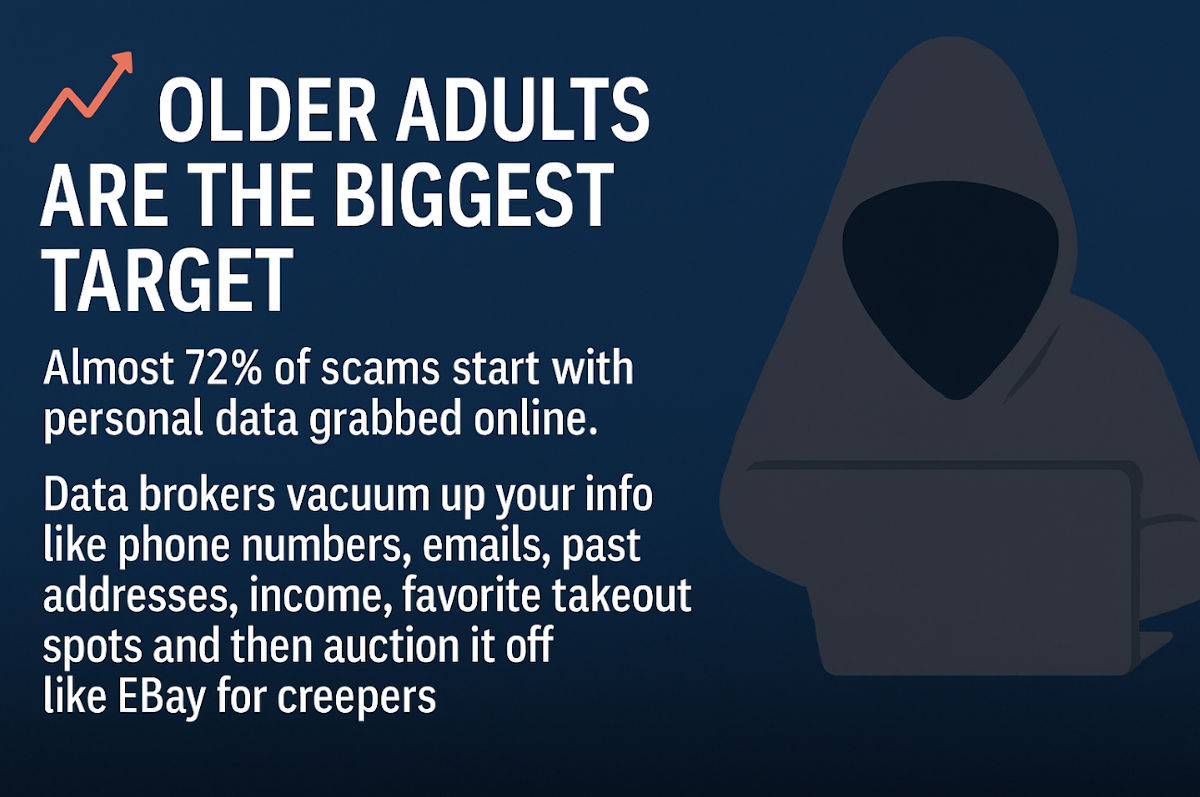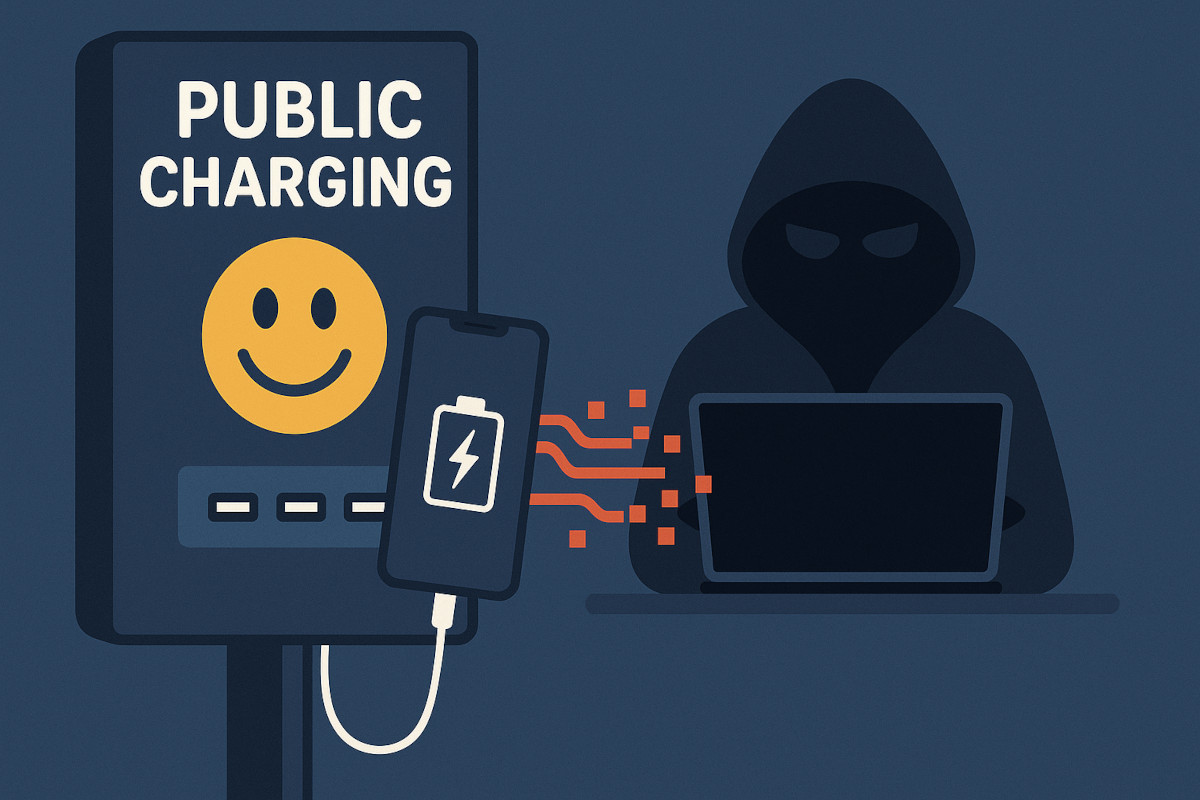Be careful online. Scammers are getting trickier than ever with fake Google Forms, phishing emails, and malicious QR codes. Here’s how to spot traps, protect your logins, financial information, and personal data before it’s too late.
Elder fraud is exploding: Your data is making it worse

I’ve got bad news: Today’s online scammers know everything about you. They’re scraping your info and everyone else’s from the web and buying the rest from data brokers and people-search sites.
📈 The stats are scary
Folks age 60-plus are the biggest target. Almost 72% of scams start with personal data grabbed online. Data brokers vacuum up your info like phone numbers, emails, past addresses, income, favorite takeout spots and then auction it off like eBay for creepers.
With this data, they use personalized weapons.
🎯 Criminals know who to target
Study this list. Here’s what these attacks look like:
- AI phone calls that sound like your grandkids.
- Medicare fraud quoting your last doctor visit.
- Calls from “your bank” that know your address.
- Investment traps tailored to your retirement income.
- Romance scams where your “lover” has the same interests.
Live in a state with higher retirement incomes?
You’re in the bull’s-eye. Texas seniors lost an average of $51,700 per complaint. My state, Arizona, had the highest elder fraud rate per capita (3.5 cases for every 1,000 seniors). Yikes.
🛡️ How to fight back
1. Freeze your credit:
Even if you’re not worried about identity theft, a credit freeze keeps crooks from opening accounts in your name.
2. Use call filtering apps:
Try tools like Hiya, Nomorobo or your carrier’s spam call protection. And never answer unknown numbers, voicemail is your friend.
Hackers want you to make this mistake

If you’re about to take a flight, pause for one hot second before you slide your phone into that shiny airport USB port. Both the FBI and FTC are waving red flags: Public charging stations can be straight-up hacker bait.
Three digital traps to avoid
Sell your data: A startup called Vana wants you to treat your personal data (Spotify plays, Netflix binges, LinkedIn stalking) as an asset you actually own. Their app acts like a wallet where you pool it with others, license it for AI training and get a cut. I say pass on this one.
💻 Share your Chromebook safely: If someone needs to borrow your Chromebook, turn on Guest Mode, so they can’t access your personal data. Sign out, then on the login screen, select Browse as Guest at the bottom, and hit Accept and continue. FYI: Remind them that downloads and bookmarks won’t be saved.
Your IP address: What it is and why you need to protect yours if you care about privacy

Using the internet is a complicated affair. It may not feel like that to you as a user. You click on your browser and get on with your day — it’s as easy as pie.
Behind the scenes, though, is a whole different story. It’s full of numbers like your Internet Protocol (IP) address, basically your digital home address. This numeric label distinguishes your phone or computer from other devices worldwide.
Are your smart devices tracking too much?
Your smartwatch is great for tracking steps, but have you ever thought about where all that personal data actually goes?
From sleep patterns to calorie intake, it’s like a digital diary — and it’s worth billions to insurance companies, marketing outfits, advertisers and, of course, hackers. Don’t panic! I’ll walk you through how to lock down your privacy.
🚨 TransUnion hacked: We all have a record here, whether we want it or not. More than 4.4 million customers had their personal data swiped from the credit bureau. The company says “no credit info was accessed” but hasn’t shared what was stolen, who’s behind it or if demands were made. You have to know they took important details like your name, DOB, SSN and other goodies. So take this news as a need for you to change your TransUnion PIN and password. Never stops.
Protect your privacy without lifting a finger: Tired of your personal data floating around online? Incogni scrubs it from data brokers and people-search sites. Get 60% off with my exclusive offer. They’ll take down info about you on specific sites, too!
Privacy opt-out trap: Researchers hit up 543 California data brokers to request their data, like you’re legally allowed to do. Nearly half ghosted them entirely. The others? Dead-end forms, pointless hoops and privacy riddles that required even more personal data. So yeah, trying to reclaim your data just means giving up more of it, along with your time. That’s why I use Incogni and you should, too.
Protect your privacy without lifting a finger: Tired of your personal data floating around online? Incogni scrubs it from data brokers and people-search sites. With my exclusive link, get 60% off unlimited plans. Choose which sites to target, and take back your privacy today!
Privacy disaster: Meta’s AI assistant scoops up personal data from Facebook and Instagram to train its models. Even public posts, comments and interactions could be fair game unless you opt out. The catch? Most people don’t even know it’s happening. If you use the app, you really need to read this now.
Protect your privacy without lifting a finger: Tired of your personal data floating around online? Incogni scrubs it from data brokers and people search sites. With my exclusive link, get 60% off unlimited plans. Choose which sites to target, and take back your privacy today!
📹 T-Mobile’s recording you: T-Mobile quietly flipped on screen recording in its T-Life app, by default. It claims it’s just “app activity,” not your personal data, and you can turn it off. But still, no opt-in? Bold move. Everyone’s phone just became a reality show, but no one got a casting call.
Why does the “IRS” want your personal data?
Spoiler: it doesn’t. IRS scams are making the rounds again. Here’s how to spot them
🚨 Word of the day: Info-stealer. Malware that sneaks in and grabs your personal data, especially credit and debit card details. Over 26 million devices were hit, with 2 million bank cards stolen and for sale on the Dark Web. Watch for small charges on your statements because that’s how hackers test if your card is still good.
Take part in research: Apple’s looking for 350,000 people for a new health study about how mental health impacts heart rate and sleep affects exercise. Spoiler: Joining means sharing a lot of personal data. Hopefully, we’ll get another useful tool like the AirPods hearing test.
Selling your car? Erase this first
Your car stores your home address, call history, and even credit card info. Before selling it, make sure your personal data doesn’t go with it.
Data brokers are selling your life. Here’s how to stop them.

The data broker industry is worth almost $400 billion. Whether it’s your Google Search history, movies you’ve streamed or a summary of your last doctor’s visit, they’re keeping tabs on your life.
Feel violated? You should. These brokers even sell your data to scammers so they can use it to target you. No wonder most people get overloaded with spam texts and calls every day.
Everything we know about the MoneyGram breach

Another day, another massive data breach. This time, it’s MoneyGram, a global mega-company that handles money transfers, bill pay and other financial services. They have digital platforms and retail locations, and they even power Walmart’s money-transfer service.